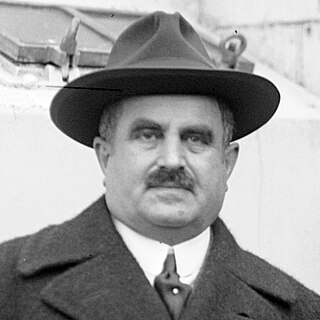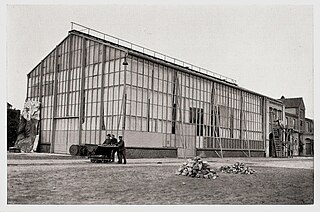Related Research Articles
UFA GmbH, shortened to UFA, is a film and television production company that unites all production activities of the media conglomerate Bertelsmann in Germany. The original UFA was established as Universum-Film Aktiengesellschaft on December 18, 1917, as a direct response to foreign competition in film and propaganda. UFA was founded by a consortium headed by Emil Georg von Stauß, a former Deutsche Bank board member. In March 1927, Alfred Hugenberg, an influential German media entrepreneur and later Minister of the Economy and Minister of Agriculture and Nutrition in Adolf Hitler's cabinet, purchased UFA and transferred ownership of it to the Nazi Party in 1933.

Joe May was an Austrian film director and film producer and one of the pioneers of German cinema.

Lya Mara was a Polish actress. She was one of the biggest stars of the German silent cinema.
Terra Film was a Berlin-based film production company. Founded in 1919, it became one of Germany's largest film production companies in the 1930s under the Nazi regime.

Paul Davidson was a German film producer.

Ellen Richter was an Austrian-Jewish film actress of the silent era. She was married to Willi Wolff, who directed many of her films. Ellen Richter composed her own production company to create her films. She worked primarily in Germany and was one of the foremost actresses of Weimar cinema.
Prussian films were a cycle of historical films made in Germany during the Weimar (1918–1933) and Nazi (1933–1945) eras noted for their general glorification of Prussian history and its military. The films are set during the eighteenth and nineteenth centuries. They particularly focused on Frederick the Great, who ruled Prussia from 1740 to 1786 greatly expanding its territory. The films were extremely popular with German audiences and an estimated forty four were produced by the end of the Second World War.

Continental-Kunstfilm GmbH was a short-lived German film production company based in Berlin, formed in February 1912 by Walter Schmidthässler and Max Rittberger. A large number of Continental-Kunstfilm's productions are now probably lost, although some significant films have survived into the 21st century.

|yearsactive = 1912–1925 }} Hedda Vernon was a German actress, screenwriter, and film producer. She was a prominent star of the early Weimar Republic, and had her own film production company.
Franz Vogel (1883–1956) was a German film producer. In 1912 he established Eiko Film which enjoyed success during the First World War. In 1913 the company constructed the Marienfelde Studios in Berlin.
Staaken Studios was a film studio located in Staaken on the outskirts of the German capital Berlin. A large former zeppelin hangar, it was converted to film use following the First World War and operated during the Weimar Republic. In July 1923 it was the largest studio in the world, with floor space of around 18,000 square feet. It was used for the construction of massive sets on a series of major productions of the silent era, including I.N.R.I., Metropolis, The Holy Mountain and The Ship of Lost Souls. These epics were a part of the German attempt on world markets during the decade. The 1927 Anglo-German co-production The Ghost Train was shot at Staaken.
National Film or National-Film was a German film production and distribution company which operated during the silent and early sound era. In the early 1920s it made an attempt to take over Erich Pommer's Decla-Bioscop, but the projected merger failed and Decla instead joined with the major studio UFA. While Decla was generally in favour of joining with National, it was pressured by its creditors Deutsche Bank to merge with UFA.

The Tempelhof Studios are a film studio located in Tempelhof in the German capital of Berlin. They were founded in 1912, during the silent era, by German film pioneer Alfred Duskes, who built a glass-roofed studio on the site with financial backing from the French company Pathé. The producer Paul Davidson's PAGU then took control and constructed a grander structure. The First World War propaganda drama The Yellow Passport, the historical comedy Madame DuBarry and the expressionist 1920 silent film The Golem were made there by PAGU.
Alfred Duskes (1881-1918) was a German film producer and director. He was one of the German pioneers of the silent era, setting up his first production company in 1905. In 1912 he founded the original Tempelhof Studios, with financial backing from the French company Pathé.

The Weissensee Studios was a collection of separate film production studios located in the Berlin suburb of Weißensee during the silent era.
Decla-Film was a German film production and distribution company of the silent era, founded by Erich Pommer and Fritz Holz in February 1915.
The Johannisthal Studios were film studios located in the Berlin area of Johannisthal. Founded in 1920 on the site of a former airfield, they were a centre of production during the Weimar and Nazi eras. Nearly four hundred films were made at Johannistal during the silent period. The first production was the 1920 silent Verkommen starring Maria Zelenka. Sometimes known as the Jofa Studios, in 1929 they became the base of the newly established German major studio Tobis Film at the beginning of the sound era.
The Union-Theater was a large cinema located on the Alexanderplatz in the German capital Berlin. Opened in 1909 it was the first of a chain of cinemas built by the German film magnate Paul Davidson. Equipped with an orchestra to accompany the action on screen, it provided a model for numerous subsequent film palaces across the German Empire. In 1913 Davidson had it remodelled and expanded its capacity to 1,200 seats, at that time the largest in the country. It hosted a number of premieres of new films, both German and foreign imports.

Wanda Treumann was a German theatre and film actress and film producer of the silent era. A leading lady in a number of productions during the Imperial era and the Weimar Republic, she retired from the screen in 1922. Her later life remains obscure.

The Terra Studios or Marienfelde Studios were film studios located in the Berlin suburb of Marienfelde.
References
- ↑ "Eiko-Film GMBH (Berlin) | filmportal.de".
- ↑ Elsaesser & Wedel p.87
- ↑ "Berliner Film-Ateliers: Eiko-Atelier".
- ↑ Kreimeier p.103